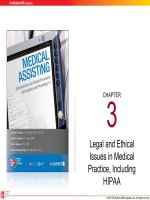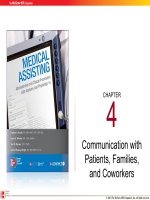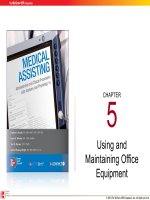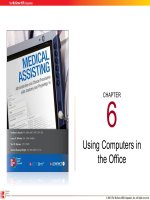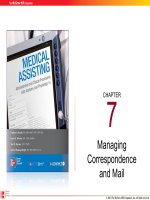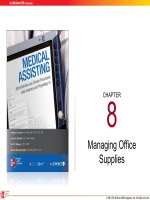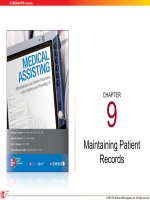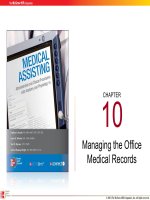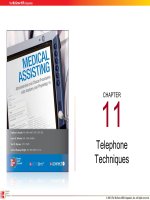Lecture Medical assisting: Administrative and clinical procedures with anatomy and physiology (4/e) – Chapter 50
Bạn đang xem bản rút gọn của tài liệu. Xem và tải ngay bản đầy đủ của tài liệu tại đây (1.46 MB, 51 trang )
CHAPTER
50
Principles of
Pharmacology
© 2011 The McGraw-Hill Companies, Inc. All rights reserved.
502
Learning Outcomes
50.1 Describe the five categories of
pharmacology.
50.2 Differentiate between chemical, generic, and
trade names for drugs.
50.3 Describe the major drug categories.
50.4 Identify the main sources of drug information.
© 2011 The McGraw-Hill Companies, Inc. All rights reserved.
503
Learning Outcomes (cont.)
50.5 Distinguish between over-the-counter
and prescription drugs.
50.6 Compare the five schedules of
controlled substances.
50.7 Describe how to register or renew a
physician with the Drug Enforcement
Administration (DEA) for permission to
administer, dispense, and prescribe
controlled drugs.
© 2011 The McGraw-Hill Companies, Inc. All rights reserved.
504
Learning Outcomes (cont.)
50.8 Carry out the procedure for renewing
medications using a telephone.
50.9 Describe how vaccines work in the immune
system.
50.10 Organize patient education topics related to
the use of nonprescription and prescription
drugs.
© 2011 The McGraw-Hill Companies, Inc. All rights reserved.
505
Introduction
• Pharmacology – science or study of
drugs
• Medication errors can result in injury or
death
• Medical assistant
– Knowledge of the foundations of
pharmacology
– Understand role of drugs in ambulatory
medical facilities
© 2011 The McGraw-Hill Companies, Inc. All rights reserved.
506
Medical Assistant’s Role in
Pharmacology
• Prescription drugs –
physician’s order
required to dispense
and administer
• OTC drugs –
purchased by patient
for self-treatment
• You should
– Be sure the physician
is aware of all
medications the
patient is taking
– Ask patients about use
of alcohol and
recreational drugs
– Provide patient
education
© 2011 The McGraw-Hill Companies, Inc. All rights reserved.
Medical Assistant’s Role in Pharmacology
507
(cont.)
• Administration of drugs
– Check state regulations
scope of practice
– Understand pharmacologic principles
– Translate prescriptions
– Answer basic patient questions
– Adhere to legal requirements
– Keep accurate records
© 2011 The McGraw-Hill Companies, Inc. All rights reserved.
508
Drugs and Pharmacology
• Drug – chemical compound used to
prevent, diagnose, or treat disease
• Pharmacognosy – study of
characteristics of natural drugs and their
sources
• Pharmacodynamics – study of what
drugs do to the body
© 2011 The McGraw-Hill Companies, Inc. All rights reserved.
509
Drugs and Pharmacology (cont.)
• Pharmacokinetics – study of what the
body does to drugs
• Pharmacotherapeutics – study of how
drugs are used to treat disease
• Toxicology – study of poisons or
poisonous effects of drugs
© 2011 The McGraw-Hill Companies, Inc. All rights reserved.
5010
Drugs and Pharmacology (cont.)
• Prescribe – physician gives a patient a
prescription to be filled by a pharmacist
• Administer – give a drug by injection,
mouth, or other route that introduces it into
the body
• Dispense – health-care professional
distributes the drug, in a properly labeled
container, to the patient for whom it is
prescribed
© 2011 The McGraw-Hill Companies, Inc. All rights reserved.
5011
Sources of Drugs
• Natural products
– Plants
– Animals
– Minerals
– Bacteria and fungi
Foxglove – source of
digitoxin
• Chemical development of natural products
– Synthesis of chemical makeup of a drug
– Manipulation of genetic information
© 2011 The McGraw-Hill Companies, Inc. All rights reserved.
5012
Apply Your Knowledge
1.
What is the role of the medical assistant in
pharmacology?
ANSWER: The medical assistant should be sure the
physician is aware of all medications the patient is
taking, including OTC medications; ask patients about
use of alcohol and recreational drugs; and provide
patient education. If the scope of practice permits, the
medical assistant may also be responsible for
administering some medications.
© 2011 The McGraw-Hill Companies, Inc. All rights reserved.
5013
Apply Your Knowledge
2.
Matching:
ANSWER:
C Study of poisons
___
A. Pharmacokinetics
A Study of what the body does to drugs
___
B. Pharmacognosy
F Used to prevent, diagnose, or treat disease
___
C. Toxicology
E Study of what drugs do to the body
___
D Study of how drugs are used to treat disease
___
D. Pharmacotherapeutics
B Study of characteristics of natural drug
___
and their sources
F. Drugs
E. Pharmacodynamics
© 2011 The McGraw-Hill Companies, Inc. All rights reserved.
5014
Pharmacodynamics
• Mechanism of action
of a drug to produce a
therapeutic effect
• Interaction between
drug and target cells
and body’s response
to the interaction
© 2011 The McGraw-Hill Companies, Inc. All rights reserved.
5015
Pharmacokinetics
•
What the body does to a drug
– Absorption
•
•
•
Conversion of a drug into a form the body can use
Allows the drug to enter the blood and tissues
Rate and extent of absorption depend on
– Route of administration
– Characteristics of the drug
– Distribution
•
Transportation of a drug from site of administration
to site of action
© 2011 The McGraw-Hill Companies, Inc. All rights reserved.
5016
Pharmacokinetics (cont.)
– Metabolism
•
•
•
Drug molecules are transformed into
metabolites
Usually in liver, some in kidneys
Affected by age, genetic makeup, and
characteristics of drug
– Excretion
•
•
Manner in which a drug is eliminated from
the body
Most via urine
© 2011 The McGraw-Hill Companies, Inc. All rights reserved.
5017
Apply Your Knowledge
What is the difference between pharmacodynamics
and pharmacokinetics?
ANSWER: Pharmacodynamics is the way a drug affects the
body to produce its effect. It is the interaction between the
drug and cells and the body's response to the interaction.
Pharmacokinetics is what the body does to the drug and
includes absorption, distribution, metabolism, and excretion
of the drug.
Very Good!
© 2011 The McGraw-Hill Companies, Inc. All rights reserved.
5018
Pharmacotherapeutics
• Clinical pharmacology
• Drug names
– Generic – official name
– International nonproprietary name
– Chemical name
– Trade – brand or proprietary name
• Generic and trade names used most often
© 2011 The McGraw-Hill Companies, Inc. All rights reserved.
5019
Pharmacotherapeutics (cont.)
• Drug categories
– Action on the body
– General therapeutic
effect
– Body system affected
• Indication and labeling
– Indication – reason(s)
for using a drug
– Must be approved by
FDA to be part of
labeling
– Off-label use
© 2011 The McGraw-Hill Companies, Inc. All rights reserved.
5020
Pharmacotherapeutics (cont.)
• Safety
– Adverse reaction to drug
– Interaction with another medication
– Be alert to patient complaints after starting a
new drug
• Efficacy – drug is working as expected
© 2011 The McGraw-Hill Companies, Inc. All rights reserved.
5021
Pharmacotherapeutics (cont.)
• If a patient complains a drug is not working
– The patient may not understand how the drug
works
– Dosage may need to be adjusted
– Therapeutic level may not have been reached
– Wrong drug may have been prescribed
– Some drugs work better for one patient than
another
– Some forms of drugs work better
© 2011 The McGraw-Hill Companies, Inc. All rights reserved.
5022
Kinds of Drug Therapy
• Acute – improve a lifethreatening or serious
condition
• Prophylactic – prevent
disease
• Empiric – given before
test results are available
• Replacement – provide
chemicals a patient lacks
• Maintenance – maintain
health
• Supportive – for a
condition other than the
primary disease
• Palliative – reduce
severity of a condition or
pain
• Supplemental – avoid a
deficiency
© 2011 The McGraw-Hill Companies, Inc. All rights reserved.
5023
Toxicology
• Study of poisonous effects of drugs
– Adverse effects
– Drug interactions
• Patient education
– Inform physician of any adverse effects
– Discuss concerns with physician or
pharmacist
© 2011 The McGraw-Hill Companies, Inc. All rights reserved.
5024
Apply Your Knowledge
1. Mr. Anderson is complaining that the new
medication does not seem to be working. What
may be the reason for this?
ANSWER: Mr. Anderson may not understand how the drug
works. His dosage may need to be adjusted, or the therapeutic
level may not have been reached. The wrong drug may have
been prescribed for him, or this particular drug may not work
for as well for him as for another patient. He may need the
medication in a different form.
© 2011 The McGraw-Hill Companies, Inc. All rights reserved.
5025
Apply Your Knowledge
2. Toxicology includes which of these?
ANSWER:
A.
B.
C.
D.
E.
Poisons and poisonous effects of drugs
Excretion of drugs
Adverse effects of drugs
Drug interactions
Metabolism of drugs
© 2011 The McGraw-Hill Companies, Inc. All rights reserved.

